21 Feb 17 | Awards, Press Releases
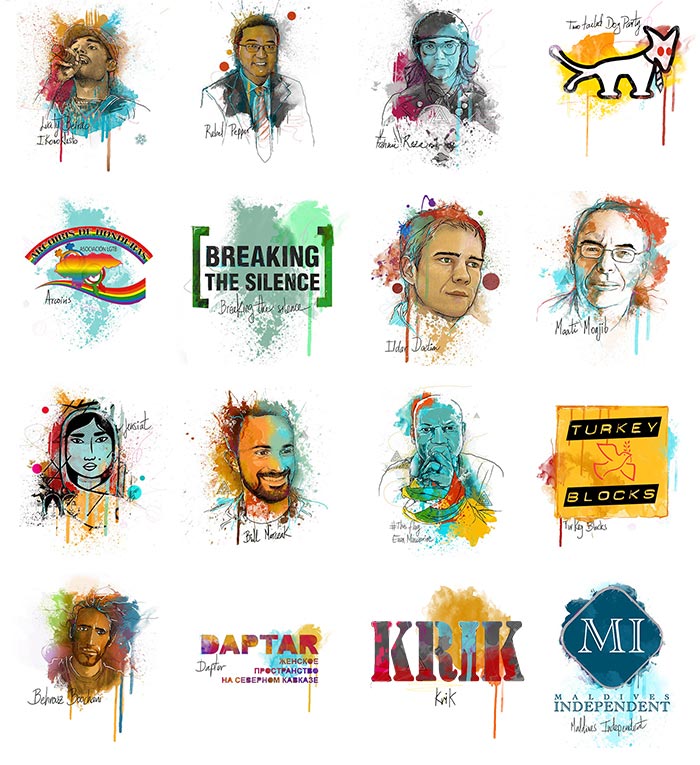
- 受邀之评判员包括演员Noma Dumezweni; 以及Vanity Fair前主编Tina Brown
- 被列入最终候选名单的言论自由活动家一共有十六人:
此奖项之最终候选者包括被津巴布韦当局拘扣的#ThisFlag活动家,一位来自伊朗在澳洲被拘留的寻求庇护者,一位中国大陆的漫画家以及一位来自俄罗斯的人权活动家。Index on Censorship 为了奖赏在世界各地与种种审查制度搏斗多年的记者以及艺术家而拟定了这个候选名单。特别值得一提的是,被大众提名的言论自由活动家一共有四百位之多。这十六位候选者为了争取言论自由经常遭受当地政府的迫害, 有的甚至面临生命危险。
Index on Censorship 之活动总裁 Jodie Ginsberg 说过:“候选者的艺术作品无论大小,都能够在争取言论自由这方面引发显著的正面效果。此奖项认可了这十六位为了争取言论自由遭受种种迫害的最终候选者。”
2017年审查指数之言论自由奖再分为四种奖项: 艺术奖,言论自由运动奖,电子活动奖以及新闻业奖。
此奖最终候选者包括来自津巴布韦的 Evan Mawarire。令Evan大失所望的当地政府促使他组织#ThisFlag这项活动。一名来自伊朗库尔德族的记者Behrouz Boochani ,也是最终候选者之一。 他记载了在巴布亚新几内亚被拘留的寻求庇护者之生活点滴。候选者当中有一位来自中国大陆的漫画家,他就是笔名为“变态辣椒” 的王立铭,以其政治讽刺漫画而闻名。 其他的候选者包括首位因参与非法集会而被监禁的俄罗斯行动主义分子, Ildar Dadin, 应付达吉斯坦妇女所面临的种种压迫之组织,Daptar, 一群塞维利亚记者为了举报贪污罪行而成立的 “KRIK”组织 , 一个为讽刺匈牙利政而成立的 “两位党”,一个称为“Arcoiris”的同志人权组织(此组织的其中六位行动主义分子因给予当地同性恋社区资助而被谋杀),一位以说唱乐揭发安哥拉的政治腐败的歌手,Luaty Beirão以及一个揭露高层贪污罪行的网站,“Maldives Independent”。
第十七度审查指数 (Index on Censorship) 之言论自由奖受邀之评判员包括哈利波特女演员Noma Dumezweni,来自Hillsborough的律师Caiolfhionn Gallagher, Vanity Fair前主编Tina Brown,Superflux 创办者Anab Jain以及音乐制作人Stephen Budd。在哈利波特 · 被诅咒的孩子里扮演Hermione的Dumezweni今年被列入Evening Standard Theatre Award最佳女演员之候选名单。对于审查指数 (Index on Censorship) 之言论自由奖,她表示:“言论自由在挑赞世界观的过程中扮演十分重要的角色。“
此言论自由奖之组办当局将在四月十九日公布审查指数 (Index on Censorship) 之言论自由奖的得奖者,而这些得奖者将会获得在交际方面的培训以及定制支持和帮助以维持他们的艺术活动。2016年审查指数 (Index on Censorship) 之言论自由电子活动奖得奖者Charlie Smith(GreatFire 组织)表示:“GreatFire这个组织一向都是匿名地独自进行活动,获得审查指数 (Index on Censorship)电子活动奖以后,我们开始与一些活动主义分子结成同志关系。Index时时刻刻都会给予我们组织运作及策略方面的辅助。”
今年审查指数 (Index on Censorship) 之言论自由奖的赞助家包括SAGE出版社,谷歌,沃达丰(Vodafone),CNN, VICE News, Doughty Street Chambers以及Psiphon与Gorkana。Sebastián Bravo Guerrero 绘画候选者的插图。
- 审查指数 (Index on Censorship)是一个出版在世界各地受审查之作品的非牟利组织。
- 以下是有关审查指数 (Index on Censorship) 之言论自由奖之候选者的资料:
- 此言论自由奖之组办当局将在四月十九日于The Unicorn Theatre, London公布审查指数 (Index on Censorship) 之言论自由奖的得奖者。
- 欲知详情,或者欲与候选者安排采访,请联络Sean Gallagher(0207 963 7262/sean@indexoncensorship.org)。若您欲知有关审查指数 (Index on Censorship) 之言论自由奖之候选者的资料,请浏览indexoncensorship.org/indexawards2017。
20 Feb 17 | News and features, Youth Board
[vc_row][vc_column][vc_column_text]Index on Censorship has recruited a new youth board to sit until June 2017. The group is made up of young students, journalists and legal professionals from countries including India, Hungary and the Republic of Ireland.
Each month, board members meet online to discuss freedom of expression issues around the world and complete an assignment that grows from that discussion. For their first task the board were asked to write a short bio and take a photo of themselves holding a quote that reflects their belief in free speech.
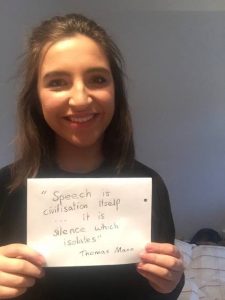 Fionnuala McRedmond – Dublin
Fionnuala McRedmond – Dublin
I graduated last June from the University of Cambridge with a degree in classics. I am now studying for a MSc in political theory at the London School of Economics. I was an active student journalist during my time at Cambridge, and it was there that I first developed an interest in the struggles of censorship and speech across the globe. The propensity for governments to censor speech and ideas is not a modern phenomenon. In ancient Rome book burning was not unheard of, and Cicero once expressed the all too familiar idea: “it is not permitted to say what one thinks… it is obviously permitted to keep silent.” Then, as much as now, free speech was the cornerstone of a healthy society. And then, as much as now, speech was censored by tyrannical power. I am particularly interested in the relationship between censorship and identity. In the past, and even more so now, people have been denied the right to share their words and ideas on the basis of ethnic, religious and political identity. Work by groups like Index on Censorship is crucial in protecting people’s right to speak, no matter who they are. I hope to better understand and develop these ideas with the Index on Censorship youth board.
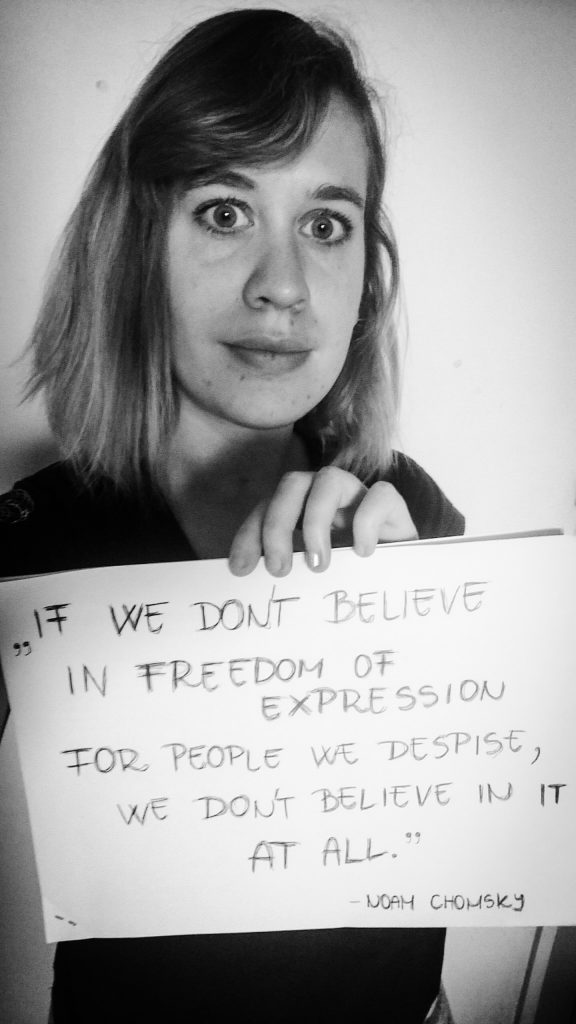 Júlia Bakó – Budapest
Júlia Bakó – Budapest
I am a Hungarian journalist, student and activist currently living in Budapest. After finishing my first degree in journalism, I have started studying international relations.
As a journalist and as someone who is deeply committed to human rights I am naturally drawn to freedom of expression and freedom of press issues. During the last couple of years I have worked with several NGOs and other organisations like Transparency International, Amnesty International, OSCE and Atlatszo.hu. I have dealt with corruption cases as an investigative journalist, I have studied human rights monitoring and – partly because of my studies, but mostly because of my personal interest and commitment – I have tried to explore freedom of expression and other issues not just in my own country, but all over the world, to find patterns, similarities and possible measures that could be taken either on a national or international level.
The quote I chose about freedom of expression says something what we sometimes tend to forget about. Being able to express our own opinions, however right they may seem to us, should never stop us from fighting for the rights of others to be able to act the same way, even though their opinions seem fundamentally different sometimes. Granting the chance to express opinions we do not agree with is what is able to create the diversity of thought, the debate about social issues and with that democracy itself.
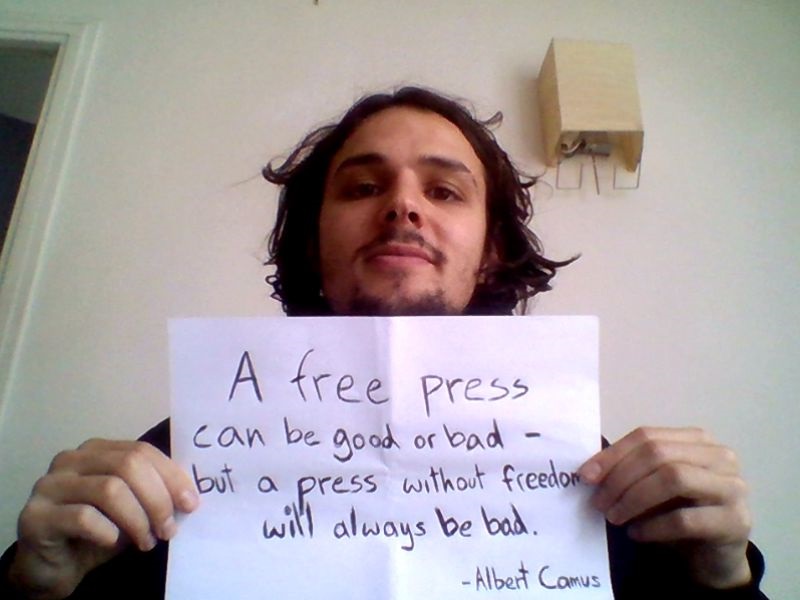 Samuel Earle – Paris
Samuel Earle – Paris
I currently live in Paris, where I am a freelance writer and English teacher.
I became interested in freedom of expression while studying politics at university – first at undergraduate and then at MSc level – and that continues today through my interest in journalism. What’s clear to me is that although freedom of expression is always valuable, the challenges it faces globally are never the same.
In the west, I think there is a complacency concerning freedom of expression: that stopping censorship is assumed to be enough. But I believe that in societies as unequal as our own, and where market forces reign, the value of freedom of expression can be diminished – as shown, for example, by the fake-news phenomenon.
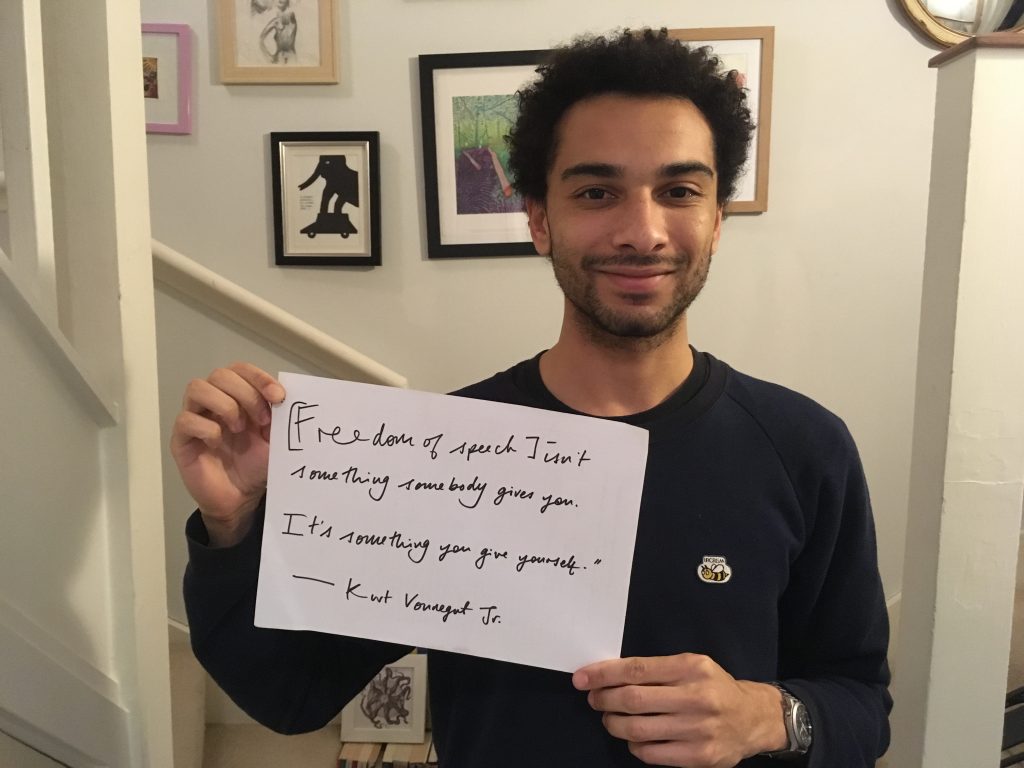 Samuel Rowe – London
Samuel Rowe – London
I am currently a postgraduate law student, having studied literature as an undergraduate in the UK and the USA. I hope to become a public law barrister, specialising in media and information law and human rights. Like the character in Kurt Vonnegut’s Hocus Pocus, I believe that the right to freedom of speech is innate. It is not a commodity; it is not something to be bargained with. My interest in issues surrounding freedom of speech directed my undergraduate dissertation, which focused on the western surveillance state. This sort of covert action can have the effect of creating an environment of self-censorship, and often has a disproportionate impact on marginalised communities. I looked at methods of resistance (of which there are many) to see how groups maintained freedom of speech under the gaze of the state. The suppression of freedom of speech is hardly a novel phenomenon and mass surveillance is just one way in which it is currently under threat. From White House officials calling disagreeable information “fake news” to irresponsible no platforming in universities, this is an era in which the limits and value of freedom of speech are being questioned. I believe that without freedom of speech, there can be no full interrogation of the evils which face us. And without interrogation, we risk losing sight of the full scope those evils might pose.
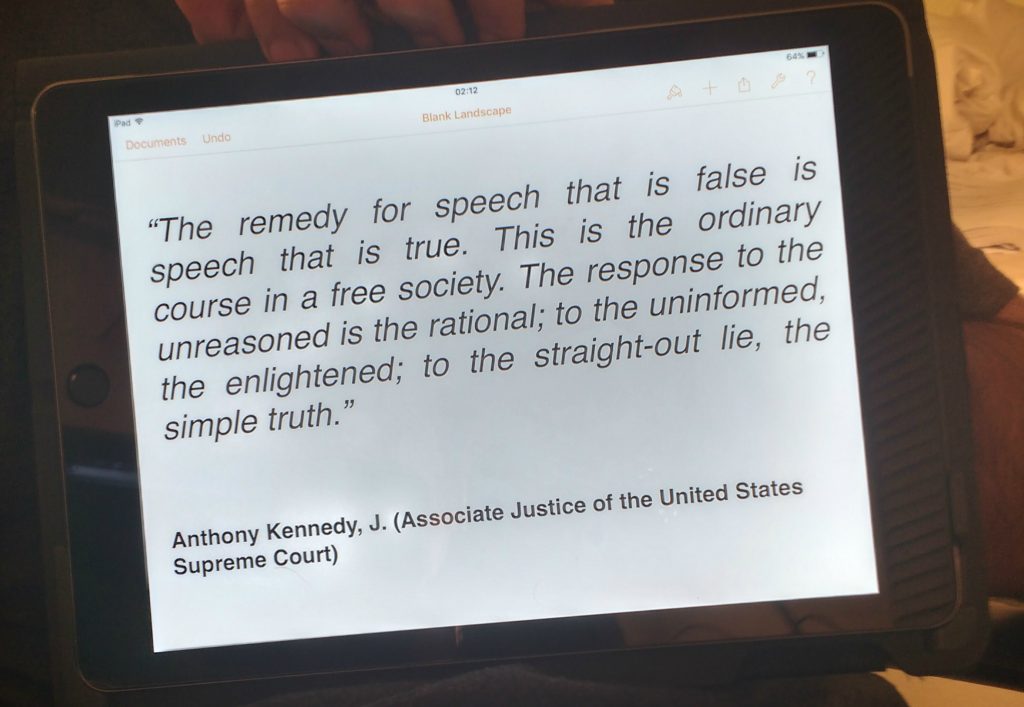 Tarun Krishnakumar – New Delhi
Tarun Krishnakumar – New Delhi
In recent times, there has been much concern expressed about the proliferation of “fake” news online and the impact it can have on democratic processes, politics and the public at large. These concerns have stirred various stakeholders – including governments, news media and internet intermediaries – into action. For instance, the German government recently declared fake news from Russia to be a significant threat to its upcoming elections. In a similar vein, internet giants like Google and Facebook – likely in the wake of unfavourable political outcomes – have been clamouring to show that they are willing to clamp down on content that is false or misleading.
In response to these developments, the quote I’ve selected manifests what, I feel, should be the appropriate response to fake speech: more “non-fake” speech – and not more regulation. While many justifications to clamp down on fake news may be well-intentioned, the history of regulating speech has shown us that inserting an intermediary into a conversation creates unintended and harmful consequences for free speech. Often this manifests as overt censorship while, in other cases, it is the creation of private arbiters of what may or may not be said on a platform – a more covert and creeping harm. Given the subjectivity in judging what news is “fake”, the debate also presents an excuse for regimes to tighten existing censorship controls or establish new ones.
The internet has given everyone an opportunity to have an equal say. This must be preserved at all costs. Fake news must be countered not through bans, blocking or regulation but by targeting the societal information asymmetries that allow it to flourish and creating conditions that facilitate society to produce more speech that is not “fake”. Policy efforts should focus on educating readers and providing them the tools to judge content for themselves – thereby minimising the effect of false or misleading content. For this, what is necessary is a culture of being exposed to a balanced diet of diverse content. When governments peddle nationalistic, religious, or political rhetoric in educational curricula and skew facts, little do they realise that they are creating the very conditions that allow “fake” news to flourish and have the harmful impacts that they complain of.
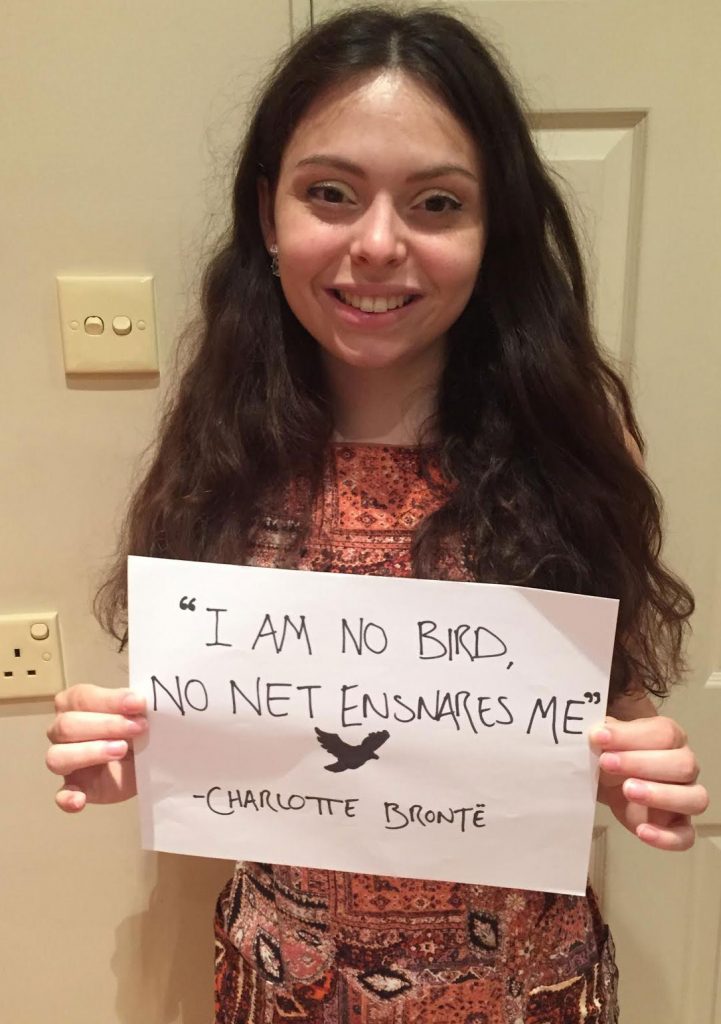 Sophia Smith-Galer – London
Sophia Smith-Galer – London
I’m a MA student studying broadcast journalism at City University in London. I studied Spanish and Arabic previously at Durham University and I’m particularly interested in how artists and writers overcome challenges to their freedom of expression in Latin America and the Middle East. As a singer I have always been intrigued by the imagery of a caged bird that sings despite its entrapment; Charlotte Bronte instead uses this metaphor to show how independent Jane Eyre has become by the end of the eponymous novel. Humans have always connected birds with freedom, or lack of – just look at Twitter’s logo – and so the quote really resonated with me.
Freedom of expression is particularly important to me as several countries that speak both of the languages I have dedicated years of study to continue to be plagued by tyrants and censors. I’m particularly interested addressing censorship in Latin America and the Middle East, especially with regard to the arts, as I’m also a classical singer and keen art historian.
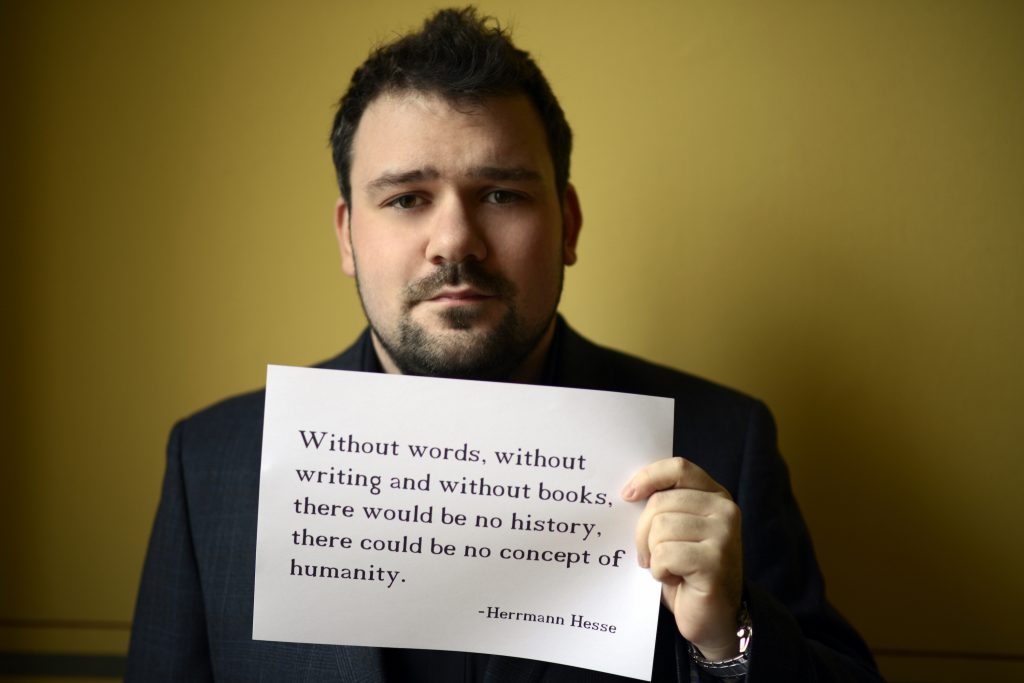 Constantin Eckner – St Andrews
Constantin Eckner – St Andrews
I am originally from Germany. I graduated from University of St Andrews with an MA degree in modern history. Currently, I am a PhD candidate specialising in human rights, asylum policy and the history of migration. Moreover, I have worked as a writer and journalist since I was 17 years old, covering a variety of topics over the years. Longer stays in cities like Budapest and Istanbul have raised my awareness for pressures exerted upon freedom of expression.
I chose this particular quote, because Hermann Hesse emphasised the importance of the written word and how it had an impact on the concept of humanity. In his time, Hesse was conscious that without writing it was not possible to express thoughts and spread ideas. Therefore, all those who fought the existence of the written word threatened humanity which was a frightening thought for a humanist like Hesse.
In a perfect world, every human being would live without fear of state censorship and potentially facing repercussions for the words they write—or for the pictures they draw, for the photos they shoot, for music they play.
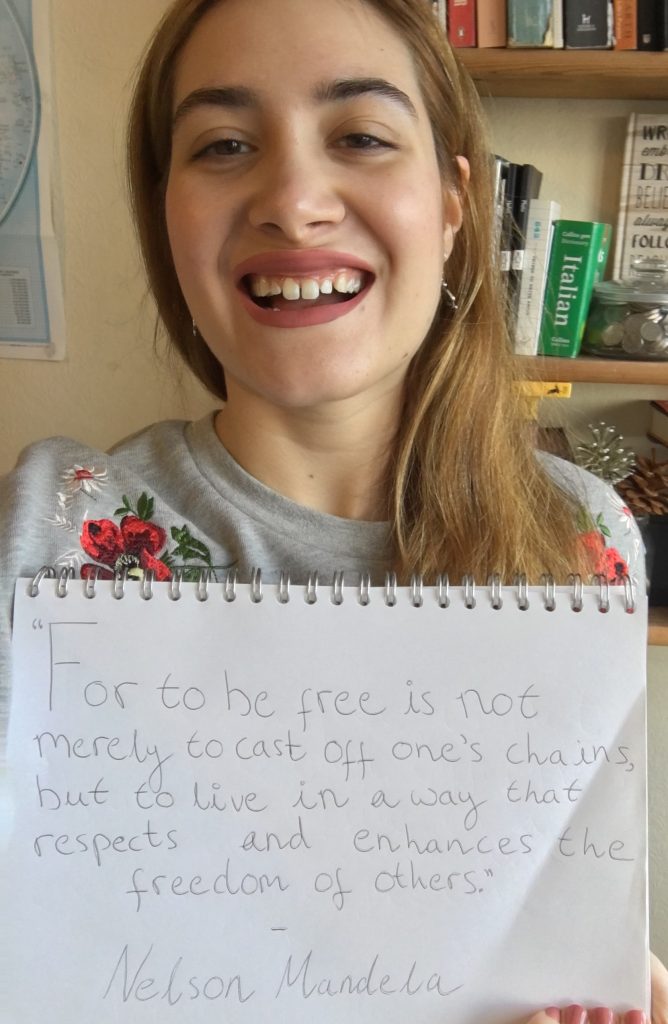 Isabela Vrba Neves – Stockholm
Isabela Vrba Neves – Stockholm
I’m half Brazilian and half Czech, raised in Sweden, but currently living in London where I work in communications for a mental health charity. I‘m also a Latin America correspondent for the International Press Foundation (IPF), a platform where young journalists get to write about stories that matter the most to them. It was during my time at Kingston University, studying journalism and French, when my interest in censorship and freedom of expression first emerged.
During my undergraduate studies I learned how important a free press is for a working democracy. It is a platform bringing together multiple voices, by sharing news, ideas and holding those in power to account. However, many journalists around the world suffer repression for simply doing their job and for using their right to free speech.
For me, Nelson Mandela‘s quote represents the importance of respecting and listening to each other, even with different views, but also highlighting the voices of those who are forced into silence.
Interviewing journalists from Venezuela and Pakistan, who face these types of constraints, has made me more engaged in sharing stories concerning freedom of expression, not only by journalists, but also by artists and activists. In the future, as a journalist, I want to focus on freedom of expression and by being part of the youth advisory board, I will be able to expand my knowledge and have great conversations with other young people who are passionate for justice and social change.[/vc_column_text][/vc_column][/vc_row][vc_row full_width=”stretch_row_content”][vc_column][three_column_post title=”More from the youth advisory board” category_id=”6514″][/vc_column][/vc_row]
17 Feb 17 | Awards, China, Digital Freedom, Fellowship, Fellowship 2016, News and features
[vc_row][vc_column][vc_column_text]

GreatFire are the 2016 Digital Activism Fellow
The 2016 Digital Activism Fellow GreatFire is a collective of anonymous individuals using technology to combat China’s draconian internet censorship regime. Charlie Smith answers questions about recent developments of China’s Great Firewall.
Index: The Chinese government warned in December that its controls on the internet are necessary to prevent foreign powers from “destabilising the state”. Would Great Fire be considered to be associated with such powers? What would be the consequences of this?
Smith: I don’t think the Chinese authorities fully understand how the internet works. They have this great image in their mind of creating “cyber sovereignty” but this is an impossible task. The internet by nature is international. Information is exchanged across borders. So, yes, foreign powers are destabilising China’s internet every minute. In the opinion of the Chinese authorities, I guess this happens every time somebody says “Xi Jinping is a totalitarian despot” or shares a photo of the great leader with his pants too high.
But even if the authorities were able to establish what they think is “cyber sovereignty”, they would quickly find that many Chinese also like saying nasty things about Xi Dada.
Index: Why do you think the latest crackdown on VPNs, requiring government registration for all VPNs based in China, is not as serious as it has been made out to be? Do you think it will make any difference to the way circumvention tools operate?
Smith: It is normal that the authorities ask that telecoms companies check to see who is using their services. There are a lot of cheap domestic VPN providers – some of whom probably do not have the interests of Chinese consumers at heart. It’s a good thing if they go out of business. Consumers will choose other solutions – other circumvention tools, foreign VPNs – and in the process learn more about how circumvention works in China. Educating the market at this stage will be very very valuable.
I think this is also one of the first times that the authorities have said that VPNs serve a purpose. If they continue with this line of messaging, they are actually saying that using a VPN is legal, not illegal. Companies are the main drivers here. If companies have problems accessing the resources that they need to run their businesses, the government will hear about it.
[/vc_column_text][vc_row_inner][vc_column_inner width=”1/4″][vc_single_image image=”85698″ img_size=”medium” onclick=”custom_link” link=”https://www.indexoncensorship.org/newsite02may/2017/02/six-sites-blocked-by-chinas-great-firewall”][/vc_column_inner][vc_column_inner width=”3/4″][vc_column_text]
[/vc_column_text][/vc_column_inner][/vc_row_inner][vc_column_text]Index: You wrote pessimistically on your blog of Google’s attempts to end censorship, and mentioned that yourselves and other companies could have far more success with access to Google’s resources. How optimistic do you feel about reaching those goals if Google continues to drag its feet?
Smith: If Google continues to sit back and do nothing except take credit for working hard to “end online censorship everywhere” we will still reach our goals. We could get there faster if we worked with Google, but they are not essential to the solution. The only explanation for Google’s inaction in fighting censorship is that they want to “re-enter” the China market by self-censoring Google Play. This would not affect our day-to-day operations too much, but it would really signal the beginning of the end in terms of working in partnership with the Chinese authorities on censorship. Google would join Apple, LinkedIn, Microsoft and many others as a bad actor, leaving only one path forward for new entrants to the China market – self-censorship.
Index: There has been talk of Chinese tech companies poaching talent from the US en masse amid President Trump’s crackdown on foreign labour and uncertainty around his stance towards Silicon Valley. Do you think this would give extra momentum to the anti-censorship movement in China?
Smith: Good question – never thought of that before.
Yes, I think this would greatly help the anti-censorship movement. There is a lot of Chinese talent overseas. It will be hard for them to come back to China and suddenly have to do without the social media and networks that they have established overseas. That shared frustration will lead them to find a better solution than just a VPN.
Index: How has your VPN monitoring service been progressing? Have numbers/uptake improved?
Smith: I think Circumvention Central has shown that VPNs are quite volatile in China. What works today may not work as well tomorrow, which you can see in our data. I think we’ve seen Chinese internet users gravitate to made-in-China solutions, like Shadowsocks.
Index: Should we be worried about China launching international state-run media through CCTV? How would it be comparable to the impact of Russia Today, for example?
Smith: China has deep pockets and is really only getting started in terms of establishing their media footprint overseas. They can afford to lose as much money as is needed to get these operations up and running and then to keep them running. But at the moment, the actual content is so poor, it’s laughable. RT seems to at least have professionals working both in front and behind the cameras. I don’t think CCTV quite has the human resources aspect of this down pat yet, but in time, they will compete for talent. However, by the time they are really ready to challenge other media outlets, I believe that foreign governments will likely place obstacles in CCTV’s path if China has not reciprocated by loosening her own media restrictions.[/vc_column_text][/vc_column][/vc_row][vc_row][vc_column][vc_basic_grid post_type=”post” max_items=”4″ element_width=”6″ grid_id=”vc_gid:1487260544112-fa906890-8334-4″ taxonomies=”8199″][/vc_column][/vc_row]
17 Feb 17 | China
[vc_row][vc_column][vc_column_text]
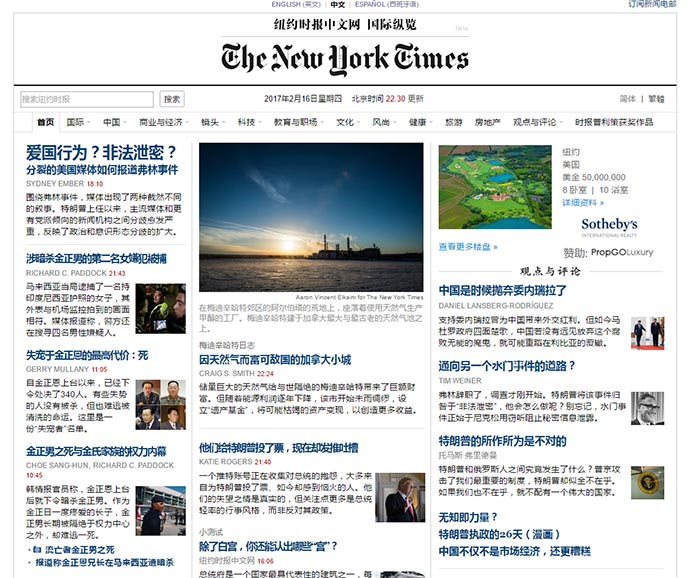
The New York Times is blocked in China.
Last month, China’s Ministry of Industry and Information Technology unveiled the country’s a new 14-month campaign to tighten control over the internet. The Chinese government is specifically concerned about virtual private networks, which punch holes through the country’s so-called “Great Firewall”. Without the VPNs, China’s internet users are unable to browse some of the world’s largest web sites. So the campaign made big news around the world.
But Charlie Smith of the 2016 Index on Censorship Digial Activism Award-winning GreatFire, an anonymous collective fighting Chinese internet censorship, told us that the VPN campaign is “actually kind of being mis-reported by the press, in general. It’s not as big a deal as it is being made out to be. We’d make a lot of noise if it was a big deal.”
Here are just six sites that are regularly blocked by China’s Great Firewall:
- YouTube
YouTube was first blocked in March of 2008 during riots in Tibet and has been blocked several times since, including on the 25th anniversary of the Tiananmen Square protests in 2014. At the time of the Tibetan riots, much of China’s population speculated that the YouTube ban was an attempt by the government to filter access to footage that a Tibetan exile group had released.
- Instagram
It’s typical for China’s internet censors to go into overdrive during politically sensitive events and/or time periods, which is why it doesn’t come as a surprise that Instagram was blocked in 2014 after pro-democracy protests in Hong Kong. To some, the block on Instagram during the protests exposed Beijing’s fears that people in the mainland might be inspired by the events taking place in Hong Kong. While some parts of the social media site may be restored, the site is still listed as 92 percent blocked.
- The New York Times
In late December 2016, the Chinese government made waves by ordering Apple to remove their New York Times app from the Chinese digital app store. According to the newspaper, the app had been removed on 23 December under regulations prohibiting all apps from engaging in activities that endanger national security or disrupt social order. The New York Times website as a whole has been blocked since 2012 in China, after the newspaper published an article regarding the wealth of former prime minister Wen Jiabao and his family. People turned to the NYT app after the blockage in order to maintain access to the the paper’s stories. Now that the app is blocked as well, the New York Times is only available to those who had downloaded the app before its removal from the store.
- Bloomberg
In June of 2012, the popular business and financial information website published a story regarding the multimillion dollar wealth of Vice President Xi Jinping and his extended family. Considering this story too invasive, the Chinese government blocked Bloomberg and has yet to reopen the site to the public. At the time, the Chinese government was going through a period of transition, as power shifted from then President Hu Jintao to Jinping.
- Twitter
Censors in China blocked access to Twitter in June of 2009 in anticipation of the 20th anniversary of the pro-democracy protests in Tiananmen Square. The move seems to reflect the government’s anxiety when it comes to the anniversary and the sensitive memories that come with it. The blocking of Twitter has also allowed for the rise of the Chinese app Weibo, a censored Twitter clone, which quickly became one of China’s most popular.
- Reuters
One of the more recent bans by the Chinese government came in the form of the international news agency Reuters. In March 2015, the organisation announced that both its English and Chinese sites were no longer reachable in the country . China has blocked media outlets like Reuters in the past, but these moves have always come after the release of a controversial story. In the case Reuters, the ban seemed to have come out of nowhere, with the reason behind the blockage still unclear.[/vc_column_text][/vc_column][/vc_row][vc_row][vc_column][vc_basic_grid post_type=”post” max_items=”4″ element_width=”6″ grid_id=”vc_gid:1487260644692-d841ab7e-8ed3-4″ taxonomies=”85″][/vc_column][/vc_row]
16 Feb 17 | Campaigns, Campaigns -- Featured, Statements
[vc_row][vc_column][vc_column_text]We, the undersigned, major journalists’ and freedom of expression organisations, are writing to urge the Permanent Council of the Organization for Security and Co-operation in Europe to ensure continuity of the Office of OSCE Representative on Freedom of the Media at the end of Ms Dunja Mijatović’s tenure.
We believe strongly in the high value and importance of the Office of the Representative on Freedom of the Media, and in the mandate for the Representative that has been agreed by all OSCE participating states:
[/vc_column_text][vc_row_inner][vc_column_inner width=”1/4″][vc_icon icon_fontawesome=”fa fa-quote-left” color=”black” background_style=”rounded” size=”lg” align=”right”][/vc_column_inner][vc_column_inner width=”3/4″][vc_column_text]
The OSCE Representative on Freedom of the Media has an early warning function and provides rapid response to serious non-compliance with regard to free media and freedom of expression. The OSCE participating States consider freedom of expression a fundamental and internationally recognized human right and a basic component of a democratic society. Free media is essential to a free and open society and accountable governments. The Representative is mandated to observe media developments in the participating States and to advocate and promote full compliance with the Organization’s principles and commitments in respect of freedom of expression and free media.”
[/vc_column_text][/vc_column_inner][/vc_row_inner][vc_column_text]Since its inception in 1998, the Office has had a mandate holder without interruption, and successive Representatives on Freedom of the Media have helped to maintain freedom of media on the policy agenda within the OSCE and made a considerable contribution to a number of initiatives related to press freedom in the OSCE region. This was made possible by both the independence conferred on the Office and the profile of the Representatives who have shown determination, vision and steadfastness in fulfilling their mandate.
We understand that the current mandate holder, Ms Dunja Mijatović, is due to leave Office in a month’s time after serving a one year extension of her two three-year terms. And yet, to date, there has been no announcement of her successor just weeks before the position becomes vacant.
This situation is of great concern to media and other stakeholders, including many organisations actively concerned for media freedom in Europe who fear losing a valuable partner and voice. The work of the Representative on Freedom of the Media is more important than ever before, with journalists facing unprecedented pressures on the continent and across the OSCE area as a whole.
We wish therefore to warn against the risk of rolling back the progress achieved in protecting media freedoms, undermining advances into promoting stable, tolerant and accountable societies.
That is why we urge all Participating States to press on the OSCE the need to appoint a new Representative on Freedom of the Media without delay and to ensure the Office’s achievements over the last two decades are not lost.
We also encourage the Participating States to use their collective weight to influence the choice of the new Representative, and by doing so, ensure the best profile possible with a track record of independence and proved commitment to freedom of expression and freedom of the press for this important position.
Brussels, 16 February, 2017
Association of European Journalists (AEJ)
Article 19
Committee to Protect Journalists (CPJ)
European Federation of Journalists (EFJ)
International Federation of Journalists (IFJ)
Index on Censorship
International Press Institute (IPI)
Reporters Sans Frontières (RSF)[/vc_column_text][/vc_column][/vc_row][vc_row][vc_column][vc_basic_grid post_type=”post” max_items=”4″ element_width=”6″ grid_id=”vc_gid:1487242081444-87bd062c-eeaa-0″ taxonomies=”6380″][/vc_column][/vc_row]
15 Feb 17 | Index in the Press
It has been almost a year to the day since I began representing Milo Yiannopoulos as his literary agent. I have largely stayed quiet about the controversy that started right before the New Year, when the book deal became public, but I feel compelled to respond to Joy Peskin, whose soapbox “Drawing the Line” appeared in Publishers Weekly on February 6. Read the full article
15 Feb 17 | Magazine, News and features, Uzbekistan
[vc_row][vc_column][vc_column_text]
Writing for Index on Censorship magazine’s autumn 2015 issue, writer Mamadali Makhmudov explored how his life had been upended by censorship in his native Uzbekistan. Arrested twice and imprisoned for 14 years, he was released in 2013 after an international outcry. He continues to be blacklisted and his works are silenced. Now, after the death of his wife, with his health failing, Makhmudov writes to bring us up to date on the frozen situation for freedom of expression for him and his country.
[/vc_column_text][vc_column_text]
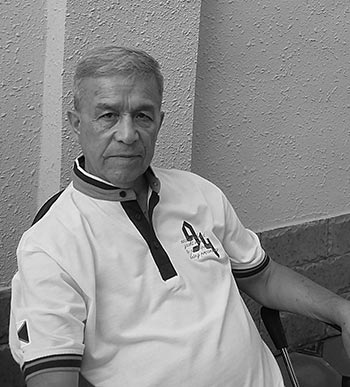
Mamadali Makhmudov
In 1943, my father Mahmud Ahmad-oghli, before he left for Great Patriotic War, said the following words to my mother, Saodat Izbosar-qizi: “Take care of my son. I will go to fight against Russian invaders on the German side…” I was a little baby then. But on my passport my age was written incorrectly: December 12, 1940. Place of birth: Boghdon village in Forish District (this name given by Tamerlane was actually named after Paris). The village I was born is situated at the foot of Nurota Mountains.
My father was a mountain-bek. Russian invaders hanged my grandfather Ahmad Aksakal in Narvon village in 1936. This is the detailed story: During its invasion of Boghdon, the wild enemy killed men, raped women, and pulled babies out of women’s wombs. That time, Ahmad Aksakal, together with his supporters, got ready to fight at Otuchganqoya rock. Using a trick, he brought the enemy (400 Russians) to the ambush at the dark ravine and suddenly attacked them, killing part of the enemy. He took 300 hundred Russians as hostages. My grandfather was so furious that he made the enemy to crack each other’s genital organs with stone. He burned them in front of the people, saying they are “unclean blood”. Now, there are three “Russian Hills” in Boghdon.
Though I know that in Judaism, Christianity and Islam, it’s not good to have bitter indignation at someone, I have a very strong desire for revenge. I finished an elementary school in Boghdon with such feelings. Later I studied at the Uchquloch gold mine (14 km far from our village) until the eighth grade.
It was my childhood dream to become a writer. I had a poor living condition, but I used to ask for books by helping people around me. Despite a hard life, I found time to read books. The works by European writers such as Shakespeare, Byron, Goethe, Hugo, Scott, translated from Russian into Uzbek, were my favorite books. May God forgive me, but I sometimes I had to deceive my mother and went to the graveyard, bush or ravines to read books till late evening.
In 1959-1961, I served in the army in Ukraine as a tank commander. In 1962, together with my crew, I went to Russia’s Efremov City in Tula region and worked at a chemistry plant construction. From there I was sent to chemical and automobile industry training in Voronezh for one year. Then I returned to Efremov and worked as mechanic’s assistant.
[/vc_column_text][vc_row_inner][vc_column_inner width=”1/4″][vc_icon icon_fontawesome=”fa fa-quote-left” color=”black” size=”lg” align=”right”][/vc_column_inner][vc_column_inner width=”3/4″][vc_column_text]
May God forgive me, but I sometimes I had to deceive my mother and went to the graveyard, bush or ravines to read books till late evening.
[/vc_column_text][/vc_column_inner][/vc_row_inner][vc_column_text]
In 1964, I came back to my homeland. I worked at Chrchiq Chemical Plant as mechanic for almost three years. Simultaneously, I finished evening courses for 10th and 11th grades. In 1966, I entered the Tashkent State University’s Faculty of Journalism. Because of a tough life, I had to study by correspondence. I worked for several newspapers in Guliston, Forish and Pakhtakor Districts as a proofreader and editor.
In 1968, the editor-in-chief of Saodat magazine, the poetess Zulfia, invited me to Tashkent and I have lived there since then.
When I was an eighth-grade schoolboy, I had a clear idea in my mind: “I will fight against Russian invaders not with a gun, but with a pen!” I think my mother, born in Kattaturk village in Samarkand, had encouraged me for such an idea. She once said to me: “Your grandpa Ahmad Aksakal often said the following: ‘Turkistan became a property for Russia. Day and night, they chased after our wealth, divided one nation into five different nations, and gave them five strange names and Cyrillic alphabet…’ You, sonny, should measure up to your grandpa!”
Based on my unchangeable faith and credo, I started writing short stories (Brook and Poplar, Horse, Hawthorn, etc.) to reveal the invader’s main purpose and ideology. They became sensation and were published in many newspapers and magazines, as well as in a collection called My Boghdon in 1971.
A power of liberty able to sweep Russian invaders from Central Asia came out that time, putting Moscow in anxiety and panic. Therefore, the Kremlin started its own propaganda against it. The propaganda was full of lie and slander (whoever believes Russia and China will never be able to correct that mistake). Russia called the freedom seekers “bosmachi” and tried to quickly get rid of them. To stand for it, I wrote my novel called Foggy Days (The Wolf of Boghdon), which also was warmly received by wide public.
Before my work appeared publicly, the USSR falsely described in historical books that “Russia annexed Central Asia.” I wrote it in my novel called Immortal Rocks, published in Sharq Yulduzi magazine in 1981. I wrote that Russia invaded Turkestan in exchange for the blood of millions of people.
For this work, I was dismissed from my work at the Writers’ Union. They took away all copies of the magazine. And I was in the black list of KGB for a long time. If Mr. Sharof Rashidov did not help me through Brezhnev, I would never come out of the prison.
Later, the novel was published in Germany, Turkey and France. I worked as the Secretary of the Writers’ Union and Chairman of Cultural Foundation. My friends know me as a person who fought for liberty.
When dependent nations gained independence thanks to Gorbachyov, a Communist, pro-Russian, ignorant and dictator became our ruler. He (Karimov) left a country full of corruption, with poor economy, agriculture, industry. He turned Uzbekistan into a big prison. He arrested freedom lovers and honest business people. Ethical norms were completely violated in the country. Eight million people left the country because of oppression, hunger and persecution. On fabricated charges (they put heroin, leaflets in my workplace and house) I was sentenced to 17 years in prison for allegedly being a member of Erk Party. I wrote several novels and short stories in the prison, but they took my work away. I hardly was able to get some parts of my novels such as Oynur, Oq Gul, and Bo’z Bo’ri. In 2013, when I was released with the help of US Secretary of State Hillary Clinton and European humanitarian organizations, I rewrote those books.
Oynur and Oq Gul are about that black history of the USSR and KGB. Bo’z Bo’ri is about the Arab invasion of Turon, their ruthless attacks, destructions of intelligentsia and other oppression. It’s about Muqanna, who bravely fought against those invaders. These books, along with my other articles and essays, are published on websites based in Europe, Canada and the United States.
I lost my health in prison, where hundreds of people die. I have had three heart attacks. I have ulcer in my stomach and my eyes have some other problems (cataract). I have six stones in my kidney. In short, I am in a poor health condition.
First of all, I need to have a stimulator installed in my heart. But I have no money for that, since we barely survive. Within 17 years, my family has been in debt. Despite working for state organisations for 40 years I receive a pension of just 179,000 UZS. And I even had to struggle for that for seven months. I don’t have enough means to buy medicine either. My books are not published in my own country. I am a banned author and I am always under surveillance.
When I was released, some humanitarian organizations in Europe and U.S., PEN Club and my friends supported me and we could get rid of 70% of our debt. Recently, my spouse Gulsara Mahmud died of heart attack. We are again in debt now.
Life is difficult. Nevertheless, I am writing the truth, only truth.
[/vc_column_text][/vc_column][/vc_row]
15 Feb 17 | Awards
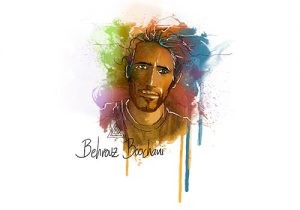
Behrouz Boochani has been shortlisted for a 2017 Index on Censorship Freedom of Expression Award in the journalism category.
Australia’s Media Entertainment Arts Alliance launched a campaign to open Australia’s borders to the Index Award-shortlisted Kurdish-Iranian journalist Behrouz Boochani, who is currently interned in Papua New Guinea.
The alliance is calling for the Australian government to resettle Boochani, along with actor Mehdi Savari and cartoonist ‘Eaten Fish’, from the Manus Island immigration detention centre to Australia.
“We believe that to continue to detain these three individuals without charge or trial undermines freedom of expression and the right to seek asylum”, according to a statement on the alliance’s website. “We urge you to allow them to be resettled in Australia so that they can live, work and contribute to Australian society.”
Boochani has been shortlisted in the journalism category of the 2017 Index on Censorship’s Freedom of Expression Awards. Winners will be announced in April.
Boochani, who has been held at the detention centre since 2013, fled the city of Ilam in Iran after police raided the magazine he had co-founded, Kurdish Cultural Heritage. After less than a month in Australia he was forcibly relocated to the newly opened “refugee processing centre” in Papua New Guinea.
Preferring not to return home, Boochani reluctantly claimed asylum in Papua New Guinea alongside nearly 1000 other prisoners hoping to make it to Australia’s mainland. He has done his best to continue writing by passionately documenting his life in the restricted detention centre.
“I have never stopped thinking and working as a journalist”, says Boochani. “Despite attempts to silence me, I have not been silenced.”
He circumvented a ban on cell phones until 2016 by trading with the local residents in Papua New Guinea. Boochani was able to write many stories via the messenger app Whatsapp, even finding the time and space to shoot a feature film on his phone.
More than 100 journalists, actors, writers and cartoonists have collaborated in writing to the prime minister and immigration minister requesting that Boochani, Savari and Eaten Fish be resettled in Australia as soon as possible.
“WE, the undersigned, write as journalists, writers, cartoonists and performers to urge you to allow our colleagues Behrouz Boochani, Mehdi Savari, and ‘Eaten Fish’ to be resettled in Australia.
All three men have sought protection as refugees from Iran and are currently detained at the Manus Island Regional Processing Centre in Papua New Guinea which is operated on behalf of the Australian Government.
Well into the fourth year of their ordeal on Manus Island, and with delays and uncertainties in relation to any US resettlement deal, the three men remain in limbo. To varying degrees, the years of detention have severely impacted their mental and physical health.
- Behrouz Boochani, 33, is a Kurdish journalist. He has worked as a journalist and editor for several Iranian newspapers. On February 17, 2013, the Islamic Revolutionary Guards Corps ransacked his offices in Ilam and arrested 11 of Boochani’s colleagues. Six were imprisoned. He has courageously continued to work as a journalist while in detention, and is a regular contributor to publications in Australia and overseas, often reporting on the situation and conditions on Manus Island. He has been recognised as a refugee and we urge you to allow him to reside in Australia to resume his career as a journalist. Boochani is a Main Case of PEN International, and has been recognised as a detained journalist by Reporters Without Borders. (RSF)
- Mehdi Savari, 31, is an Ahwazi Arab performer. As an actor, he has worked with numerous theatre troupes in many cities and villages in Iran, and performed for audiences in open public places. He was also well-known as the host of a satirical children’s TV show before fleeing Iran. Mehdi is a person of short stature and has met with severe discrimination over his life. His dwarfism has been exacerbated by the conditions and his treatment on Manus Island over the last three years, and he continues to suffer a range of physical ailments and indignities, as well as regular bouts of depression and chronic pain. As he has also been recognised as a refugee, we urge you to facilitate his resettlement in Australia. We also refer you to a resolution passed by the International Federation of Actors congress in Sao Paulo, Brazil, in September calling for his release from detention.
- Eaten Fish, 24, is a cartoonist and artist who prefers to be known by his nom-de-plume. He has recently received Cartoonists’ Rights Network International’s 2016 award for Courage in Editorial Cartooning. His application for refugee status has not been assessed. Since he was detained at Manus Island, he has been diagnosed with mental illnesses which have been compounded by his incarceration. We urge you to allow him to live in Australia until the final status of his claim can be determined.
As journalists, cartoonists, writers and performers, we are aware that the rights we enjoy are matched by a responsibility to challenge and confront tyranny and wrongdoing, to bear witness and uphold truth, and to reflect our society, even if sometimes unfavourably. We are privileged that in Australia we are able to pursue these ends without fear of persecution or threat to our personal liberty.
We believe that to continue to detain these three individuals without charge or trial undermines freedom of expression and the right to seek asylum. All three have courageously continued to practice their vocations on Manus Island despite their incarceration. We urge you to allow them to be resettled in Australia so that they can live, work and contribute to Australian society.
MEAA is joined in this letter by the the International Federation of Journalists, the International Federation of Actors, Reporters Without Borders, the Cartoonists’ Rights Network International, PEN International and members of the global network of the International Freedom of Expression Exchange.
We urge you to give the cases for resettlement of these three men serious consideration.”
14 Feb 17 | Index in the Press
Chairman of press regulator IPSO Sir Alan Moses has said unpicking legislation brought in after part one of the Leveson Inquiry, including the Section 40 cost provision amendments, could take up to 15 years. Read the full article
14 Feb 17 | Bahrain, Bahrain News, Middle East and North Africa, News and features
[vc_row full_width=”stretch_row_content_no_spaces” css_animation=”fadeIn” css=”.vc_custom_1487082444020{padding-top: 250px !important;padding-bottom: 200px !important;background-image: url(https://www.indexoncensorship.org/newsite02may/wp-content/uploads/2017/02/Bahrain_2011.jpg?id=85632) !important;}”][vc_column][/vc_column][/vc_row][vc_row][vc_column][vc_column_text]
Bahrain’s Day of Rage on 14 February 2011 kickstarted one of the largest popular uprisings in the country’s history. Bahraini youth took to social media and called on people “to take to the streets” in protest of the endemic corruption, discrimination and injustice.
Many of the 55 peaceful demonstrations on the day were met with violence from police and soldiers, leaving more than 30 protesters injured and one dead.
Six years on, the Bahraini government has fostered an atmosphere of fear and repression, through the detention and torture of opposition leaders and supporters, designed to stifle all dissent.
Here are 10 articles and reports explaining where Bahrain is today and how it got here.
“Two Bahrainis appear to be at imminent risk of execution despite the authorities’ failure to properly investigate their allegations of torture, Human Rights Watch said today. Both Mohamed Ramadan and Husain Ali Moosa have disavowed confessions that they allege were the result of torture and that were used as evidence in a trial that violated international due process standards.”
– Human Rights Watch, 23 January 2017
“Bahrain continuously stifles free speech and silences critics. It also has the highest prison population per capita in the Middle East, including 3,500 prisoners of conscience.”
– Index on Censorship, 23 January 2017
The IP Spy Files explore how Bahrain’s government silences anonymous online dissent by targeting activists with ispy links on social media networks and subsequently arresting them.
“On 15 March 2011 Bahrain’s king brought in a three-month state of emergency, which included the through establishing of military courts known as National Safety Courts. The aim of the decree was to quell a series of demonstrations that began following a deadly night raid on 17 February 2011 against protesters at the Pearl Roundabout in Manama, when four people were killed and around 300 injured.”
– Index on Censorship, 17 August 2016
“2015 saw a year-on-year increase of the systemic use of arbitrary detention of those who speak out against the Bahraini regime. Index calls on the Bahraini authorities to end arbitrary arrests and immediately release all prisoners of conscience.”
– Index on Censorship, 2 June 2016
“Bahrain, in particular, has intensified the use of stripping citizenship from those who dissent or speak out in protest as a form of punishment. Since 2012 – when the country’s minister of the interior made 31 political activists stateless, many of whom were living in exile – 260 citizens have fallen victim, 208 in 2015 alone. Eleven juveniles, at least two of which have received life sentences, and 30 students are known to be among them.”
– Index on Censorship, 28 April 2016
“Contrary to the popular narrative on Bahrain, sectarianism was not the dominant motivating factor behind the 2011 uprising or the protest movements which preceded it.”
– Middle East Institute, 19 January 2016
“As a family, we’ve decided that it would be important for us to write about the hardships we have personally endured on an individual and family level as a direct consequence of the punishment handed down by the government, which fears the pure and peaceful expression of speech.”
– Index on Censorship, 25 October 2015.
“Bahrain’s prison authorities continue to humiliate, torture and mistreat inmates at Jau Prison […] [P]sychological and physical torture, prevention of medical care, and massive overcrowding remain a systemic failure of Bahrain’s prison system.”
– BIRD, 26 June 2015
“Following the fall of authoritarian regimes in Tunisia and Egypt, hundreds of thousands of Bahraini protesters took to the streets of Manama, the capital city, on 14 February, 2011, to peacefully call for democratic reform. Officials were quick to crack down on protests, and the access of the international media was limited almost immediately after the start of the protests. Unlike other citizens demonstrating across the Arab World in 2011, the protests in Bahrain have received very little coverage, particularly considering the disproportionate number of people jailed and killed in the tiny country of 1.2 million people. ”
– Index on Censorship, 15 January 2012
[/vc_column_text][/vc_column][/vc_row][vc_row][vc_column][vc_column_text]Image credit: Al Jazeera English. [/vc_column_text][/vc_column][/vc_row][vc_row][vc_column][vc_basic_grid post_type=”post” max_items=”4″ element_width=”6″ grid_id=”vc_gid:1487179952538-7949f96c-116b-3″ taxonomies=”716″][/vc_column][/vc_row]
14 Feb 17 | News and features, Press Releases
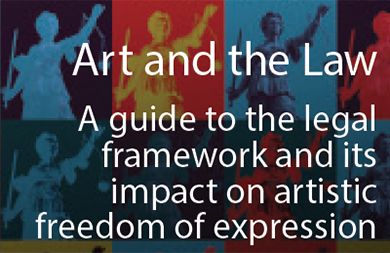
Art and the Law gives artists and arts organisations guidance about the legal implications of controversial work across five areas: Child Protection, Counter Terrorism, Obscene Publications, Public Order, and Race and Religion
Arts Council England has awarded Index on Censorship funding for the organisation’s work tackling censorship and self-censorship in the arts.
The £100,000 grant will be used to provide workshops for boards and senior management of arts organisations in England and Wales on issues of censorship and other ethical challenges as they affect programming, fundraising and managing controversy. The workshops, delivered with partners Cause4 and the What Next? movement will roll out practical ways to support freedom of expression, so that practitioners feel confident they can create great work — not just safe work.
The programme develops the long-standing work by Index on censorship and self-censorship in the arts, including its ‘Taking the Offensive’ conference in the South Bank, which identified widespread self-censorship in the sector. In 2015, Index — in collaboration with a number of legal advisers and with the support of the Arts Council and Clifford Chance — produced a series of guidance booklets entitled ‘Art and Offence’ that examined various aspects of the law and freedom of expression in England and Wales. The guidelines on public order are being distributed nationwide by the police service to help officers better understand the issues faced by arts venues in hosting potentially controversial work, and police commanders will be invited to training workshops.
The award also builds on research and guidance produced by What Next? on meeting ethical and reputational challenges. With additional funds from Theatre Development Trust, they will develop a nationwide network of local groups who will support colleagues facing ethical challenges. In parallel, and drawing on cases that surface through this nationwide programme, Index will research examples of censorship faced by arts groups in England and Wales to form the basis of a report into the state of free expression in the arts to be published at the end of the programme.
“We are delighted that the Arts Council values this work. A risk-averse culture is putting artistic expression under severe pressure,” said Jodie Ginsberg, CEO of Index on Censorship. “In the recent past, we have seen plays, performances and exhibitions being cancelled when faced with a hostile public reaction, or where police have advised closure. A disturbing pattern is emerging, which diminishes the arts.”
Simon Mellor, Deputy Chief Executive, Arts Council England, said: “Some of our greatest art has, over our history, been created by artists taking on the important issues of their day. And they have often done it in a way that audiences have found difficult and uncomfortable. But by provoking a strong response, public understanding of those issues has often deepened. We need to do all we can to create the conditions in which today’s artists can continue to provoke and challenge. The Arts Council is pleased to be supporting this important project by Index on Censorship which will support arts and cultural organisations to help artists take risks, be provocative and, hopefully, create great art.”
Notes to editors
Index on Censorship is a UK-based freedom of expression charity that campaigns against censorship and promotes free expression worldwide. Founded in 1972, Index has published some of the world’s leading writers and artists in its award-winning quarterly magazine, including Nadine Gordimer, Mario Vargas Llosa, Samuel Beckett and Kurt Vonnegut. It also has published some of the greatest campaigning writers from Vaclav Havel to Aung San Suu Kyi.
What Next? is a national movement of arts and cultural organisations, artists, funders, policy makers, institutions, and individuals who come together regularly to articulate and strengthen the role of culture in society. It is an open network of self-forming chapters, building relationships with local and national government, forming alliances outside of the cultural sector, and engaging the public in new and different conversations about the arts. It is chaired by Artistic Director of the Young Vic, David Lan. Over the last four years the What Next? movement has grown organically to encompass 34 chapters around the UK, they bring together individuals, organisations and institutions to work on locally significant issues, and to consider how to contribute to wider action.
Arts Council England champions, develops and invests in artistic and cultural experiences that enrich people’s lives. We support a range of activities across the arts, museums and libraries – from theatre to digital art, reading to dance, music to literature, and crafts to collections. Great art and culture inspires us, brings us together and teaches us about ourselves and the world around us. In short, it makes life better. Between 2015 and 2018, we plan to invest £1.1 billion of public money from government and an estimated £700 million from the National Lottery to help create these experiences for as many people as possible across the country. www.artscouncil.org.uk
14 Feb 17 | Magazine
[vc_row full_width=”stretch_row_content” full_height=”yes” columns_placement=”stretch” equal_height=”yes” css=”.vc_custom_1594032073955{background-image: url(https://www.indexoncensorship.org/newsite02may/wp-content/uploads/2016/10/magazine-art-1460×490.png?id=80524) !important;}”][vc_column][/vc_column][/vc_row][vc_row][vc_column][vc_custom_heading text=”Shakespearean actress Janet Suzman said about our special Shakespeare 400 issue: “From every corner of the unfree world the essays you have printed bear me out; theatre is a danger to ignorance and autocracy and Shakespeare still holds the sway. I congratulate you and Index on giving such space to a writer who is still bannable after 400 plus years.”” google_fonts=”font_family:Libre%20Baskerville%3Aregular%2Citalic%2C700|font_style:400%20italic%3A400%3Aitalic”][/vc_column][/vc_row][vc_row][vc_column][vc_column_text]
A quarterly magazine set up in 1972, Index has published oppressed writers and refused to be silenced across 252 issues.
The brainchild of the poet Stephen Spender, and translator Michael Scammell, the magazine’s very first issue included a never-before-published poem, written while serving a sentence in a labour camp, by the Nobel Prize-winning Soviet dissident Aleksandr Solzhenitsyn.
The magazine continued to be a thorn in the side of Soviet censors, but its scope was far wider. From the beginning, Index declared its mission to stand up for free expression as a fundamental human right for people everywhere – it was particularly vocal in its coverage of the oppressive military regimes of southern Europe and Latin America, but was also clear that freedom of expression was not only a problem in faraway dictatorships. The winter 1979 issue, for example, reported on a controversy in the United States in which the Public Broadcasting Service had heavily edited a documentary about racism in Britain, and then gone to court attempting to prevent screenings of the original version.
[/vc_column_text][/vc_column][/vc_row][vc_row][vc_column width=”1/4″][vc_icon icon_fontawesome=”fa fa-quote-left” color=”custom” align=”right” custom_color=”#dd3333″][/vc_column][vc_column width=”3/4″][vc_custom_heading text=”An archive of past battles won, and a beacon of present and future struggles. It’s unique brand of practical, practising advocacy is as necessary as ever.” font_container=”tag:h2|text_align:left|color:%23dd3333″ google_fonts=”font_family:Libre%20Baskerville%3Aregular%2Citalic%2C700|font_style:400%20italic%3A400%3Aitalic”][/vc_column][/vc_row][vc_row][vc_column][vc_column_text]
Index stood firmly against the apartheid regime. South African Nadine Gordimer, yet another Nobel prize-winning author, wrote regularly for the magazine. Big names from around the literary world flocked to contribute to the magazine, often before their struggles had brought internal accolade – a single issue in 1983 included the exiled Nigerian writer Wole Soyinka, later a Nobel prize winner, and Czechoslovakian dissident Vaclav Havel, who went on to be his country’s last president before it split into Slovakia and the Czech Republic. Kurt Vonnegut and Arthur Miller were also among the more famous bylines. Salman Rushdie, the author at the centre of the Satanic Verses controversy, was frequently featured on Index’s pages while there was a bounty offered for his murder by the Iranian government.
After the fall of communism, there was a widespread misconception that censorship was “over”, but journalists, authors and dissidents have continually reached out to Index when squeezed. The Russian reporter Anna Politkovskaya wrote in 2002 of the threats made against her life when she began investigating Russia’s war in Chechnya, four years before she was assassinated in Moscow.
After more than 40 years, Index continues to stand with the silenced all over the world. In October 2016, the Times Literary Supplement described it as “an archive of past battles won, and a beacon of present and future struggles. It’s unique brand of practical, practising advocacy is as necessary as ever.”
[/vc_column_text][vc_column_text]Words: Kieran Etoria-King[/vc_column_text][/vc_column][/vc_row][vc_row content_placement=”top”][vc_column width=”1/3″][vc_custom_heading text=”Support Index” font_container=”tag:p|font_size:24|text_align:left” link=”url:https%3A%2F%2Fwww.indexoncensorship.org%2Fnewsite02may%2F2016%2F12%2Ffashion-rules%2F|||”][vc_column_text]
In times of extraordinary crisis, governments often take the opportunity to roll back on personal freedoms and media freedom.
Will you join with others from around the world who have concerns about restrictions on freedoms to support our work?
 DONATE NOW[/vc_column_text][/vc_column][vc_column width=”1/3″][vc_single_image image=”113840″ img_size=”medium” alignment=”center” onclick=”custom_link” link=”https://www.indexoncensorship.org/newsite02may/2016/12/fashion-rules/”][/vc_column][vc_column width=”1/3″ css=”.vc_custom_1481888488328{padding-bottom: 50px !important;}”][vc_custom_heading text=”Subscribe” font_container=”tag:p|font_size:24|text_align:left” link=”url:https%3A%2F%2Fwww.indexoncensorship.org%2Fnewsite02may%2Fsubscribe%2F|||”][vc_column_text]The world’s most important writers. In print, online. In your mailbox, on your iPad.
DONATE NOW[/vc_column_text][/vc_column][vc_column width=”1/3″][vc_single_image image=”113840″ img_size=”medium” alignment=”center” onclick=”custom_link” link=”https://www.indexoncensorship.org/newsite02may/2016/12/fashion-rules/”][/vc_column][vc_column width=”1/3″ css=”.vc_custom_1481888488328{padding-bottom: 50px !important;}”][vc_custom_heading text=”Subscribe” font_container=”tag:p|font_size:24|text_align:left” link=”url:https%3A%2F%2Fwww.indexoncensorship.org%2Fnewsite02may%2Fsubscribe%2F|||”][vc_column_text]The world’s most important writers. In print, online. In your mailbox, on your iPad.
Subscription options from £18.
Every subscriber helps support Index on Censorship’s projects around the world.
 SUBSCRIBE NOW[/vc_column_text][/vc_column][/vc_row]
SUBSCRIBE NOW[/vc_column_text][/vc_column][/vc_row]



 Fionnuala McRedmond – Dublin
Fionnuala McRedmond – Dublin Júlia Bakó – Budapest
Júlia Bakó – Budapest Samuel Earle – Paris
Samuel Earle – Paris  Samuel Rowe – London
Samuel Rowe – London Tarun Krishnakumar – New Delhi
Tarun Krishnakumar – New Delhi Sophia Smith-Galer – London
Sophia Smith-Galer – London Constantin Eckner – St Andrews
Constantin Eckner – St Andrews Isabela Vrba Neves – Stockholm
Isabela Vrba Neves – Stockholm



